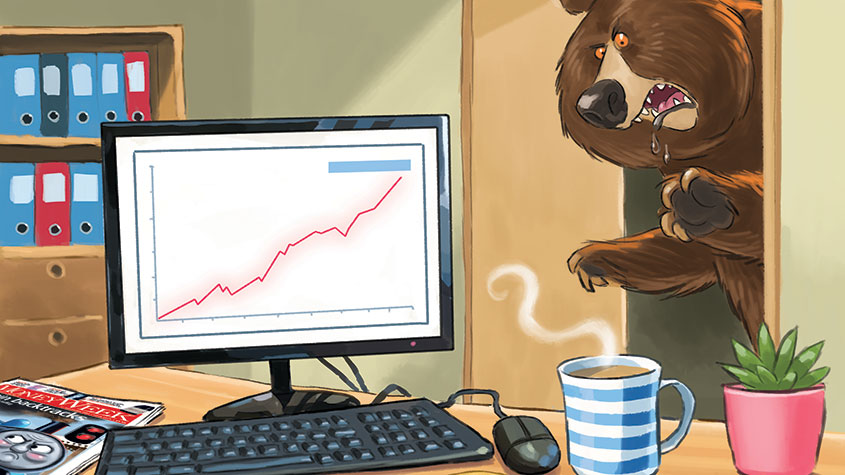Timely lessons from Tokyo
Some asset classes are looking wildly expensive , says John Stepek, Investors should keep to the script and look for value.

Get the latest financial news, insights and expert analysis from our award-winning MoneyWeek team, to help you understand what really matters when it comes to your finances.
You are now subscribed
Your newsletter sign-up was successful
Want to add more newsletters?

Twice daily
MoneyWeek
Get the latest financial news, insights and expert analysis from our award-winning MoneyWeek team, to help you understand what really matters when it comes to your finances.

Four times a week
Look After My Bills
Sign up to our free money-saving newsletter, filled with the latest news and expert advice to help you find the best tips and deals for managing your bills. Start saving today!
It's one of the all-time classic bubble statistics. During Japan's bubble of the late 1980s, which drove up the prices of everything from stocks to property to fine art, the land under the Imperial Palace was said to be worth as much as the entire state of California.
The story is apocryphal sadly no one keeps an official central Tokyo to Californian land mass' ratio index but it does give a flavour of just how crazy things became.
If you look at the actual historical data, as Dan McCrum noted on the FT's Alphaville blog this week, then at the peak of the bubble in 1990 a new flat in greater Tokyo would have cost you 18 times the average annual income.
MoneyWeek
Subscribe to MoneyWeek today and get your first six magazine issues absolutely FREE

Sign up to Money Morning
Don't miss the latest investment and personal finances news, market analysis, plus money-saving tips with our free twice-daily newsletter
Don't miss the latest investment and personal finances news, market analysis, plus money-saving tips with our free twice-daily newsletter
Why is this relevant? Because, says McCrum, if you look at London prices today, some prime areas of Londonare already far more expensive than that.
In Kensington and Chelsea, the average house will set you back a whopping 32 times median income, while Westminster is above 20.
Sure, it's hardly comparing like with like prime properties in Tokyo "undoubtedly went for more than 18 times income at the peak", says McCrum. All the same, "it seems prudent to at least ponder the comparison, given that Japan's bust was followed by two decades of falling house prices".
London property is hardly the only expensive-looking asset out there. US stocks have now been overpriced for so long that we're getting to that stage in the investment cycle where people start taking it for granted and making up excuses as to why it can continue long into the future.
While the surge in asset prices has unquestionably been driven at least in part by central banks printing money to suppress interest rates, fear about the very real fact that money printing in America is ending, and rate rises are coming, has given way to complacency.
What can an investor do? Well, what you should always do look for value. Avoid stocks in countries where they are expensive (like the US), or where they're not quite priced for the sorts of political risks that might be out there (at least some UK-listed stocks fall into this category).
Hold some cash. If you're a keen risk-taker, you could invest in markets that look very cheap, such as China (I intend to invest some money here myself) or Russia (I'm giving that one a miss, but some of my colleagues are more keen).
As for the rest, buy assets in markets where prices remain reasonable and in the present environment, it also helps if the promise of more printed money is there to underpin them. One such market is Europe, where we're still happy to buy.
And another, of course, is Japan, which is still showing promising signs of recovering from its long, long slump. It'll be a long time before the land under the Imperial Palace is worth anything approaching the prices seen in 1990 and that's just the way we like it.
Get the latest financial news, insights and expert analysis from our award-winning MoneyWeek team, to help you understand what really matters when it comes to your finances.

-
 Should you buy an active ETF?
Should you buy an active ETF?ETFs are often mischaracterised as passive products, but they can be a convenient way to add active management to your portfolio
-
 Power up your pension before 5 April – easy ways to save before the tax year end
Power up your pension before 5 April – easy ways to save before the tax year endWith the end of the tax year looming, pension savers currently have a window to review and maximise what’s going into their retirement funds – we look at how
-
 What to do as the age of cheap money and overpriced equities ends
What to do as the age of cheap money and overpriced equities endsEditor's letter The age of cheap money, overpriced equities and negative interest rates is over. The great bond bull market is over. All this means you will be losing money, says Merryn Somerset Webb. What can you do to protect yourself?
-
 Investors are bullish – but be very careful
Investors are bullish – but be very carefulEditor's letter Many investors are buying the dip, convinced the latest upswing is the start of a new bull market. The odds are that it’s not, says Andrew Van Sickle. The bear has unfinished business.
-
The MoneyWeek approach to investing
Editor's letter At MoneyWeek, our aim is simple: to give you intelligent and enjoyable commentary on the most important financial stories, and tell you how to profit from them. So how do we do that?
-
 Celebrity bitcoin ads echo the subprime mortgage crisis
Celebrity bitcoin ads echo the subprime mortgage crisisEditor's letter A wave of ads featuring celebrities punting crypto to the masses are reminiscent of how low income Americans were encouraged to take on loans they couldn’t afford, says Merryn Somerset Webb.
-
 Will the UK's property slowdown turn into a house-price crash?
Will the UK's property slowdown turn into a house-price crash?Editor's letter As the cost-of-living crisis intensifies and interest rate rise, it is hard to see reasons for UK house prices to keep rising, says Merryn Somerset Webb.
-
 The unintended consequences of ESG investing
The unintended consequences of ESG investingEditor's letter Many people are refusing to invest in energy companies, citing "ESG" concerns. But we still need fossil fuels, says Merryn Somerset Webb, and will for years to come. Boycotting the sector is a bad idea.
-
 What sardines can teach investors about today's markets
What sardines can teach investors about today's marketsEditor's letter A California tale of “eating sardines” and “trading sardines” can help us divide investments into speculative and real, says Merryn Somerset Webb. Something that's very useful when looking at today’s markets.
-
 The market finally seems to be getting it
The market finally seems to be getting itEditor's letter Reality checks are coming fast to the markets, says Merryn Somerset Webb – with even 2022’s safe havens beginning to reflect recession worries.